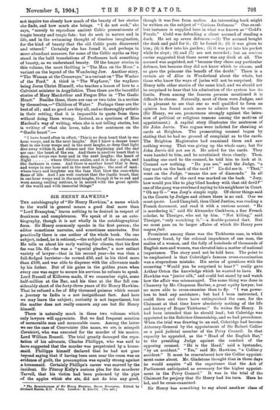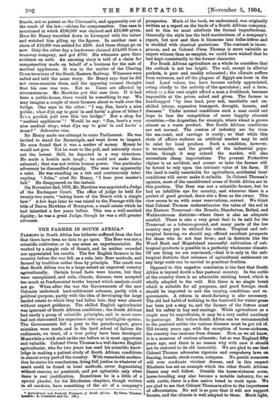SIR HENRY HAWKINS.*
THE autobiography of "Sir Henry Hawkins," a name which to the world in general means a good deal more than "Lord Brampton," leaves nothing to be desired in respect of frankness and completeness. We speak of it as an auto- biography, though it is not wholly in the autobiographical form. Sir Henry commonly speaks in the first person ; the -editor sometimes narrates, and sometimes annotates. But practically there is one author of the whole book. On one subject, indeed, he is reticent,—the subject of his emoluments. He tells us about his early waiting for clients, that his first fee was 10s. 6d.—he was a "special pleader," a now extinct variety of lawyer—that in his second year—he was then a full-fledged barrister—he earned 250, and in his third more than 2100, and was able to dispense with the allowance made by his father. But of his gains in the golden years when every one was eager to secure his services he refuses to speak. Lord Russell of Killowen made, if we remember right, some half-million at the Bar, and his time at the Bar fell con- siderably short of the forty-three years of Sir Henry Hawkins. That he refused a fee of fifty thousand guineas which meant a journey to India is a not insignificant fact. And here we may leave the subject; curiosity is not impertinent, but the matter does not really concern any one but Sir Henry himself.
There is naturally much in these two volumes which only lawyers will appreciate. But we find frequent mention of memorable men and memorable cases. Among the latter we see the case of Courvoisier (the name, we see, is misspelt Corvisier), who was executed for the murder of his master, Lord William Russell. The trial greatly damaged the repu- tation of his advocate, Charles Phillipps, who was said to have suggested that the murder was perpetrated by a house- maid. Phillipps himself declared that he had not gone beyond saying that if having been seen near the room was an .evidenoe of guilt, the presumption was equally strong against .a housemaid. Certainly Phillips's career was marred by the incident. Sir Fitzroy Kelly's curious plea for the murderer Tarvell, that his victim had been poisoned by the pips -of the apples which she ate, did not do him any good, • The Benaniscences of Sir Henry Hawkins, Baron Brampton. Edited by sttiobard Harris, B.C. 2 vols. London : E. Arnold. [30s. net] though it was free from malice. An interesting book might be written on the subject of "Curious Defences." One excel- lent instance is supplied here in what was known as "Coda's Puzzle." Codd was defending a client accused of stealing a duck. He set up seven defences :—(1) The accused bought the duck and paid for it; (2) he found it ; (3) it was given to him ; (4) it flew into his garden ; (5) it was put into his pocket while he slept; (6) and (7) are not recorded ; but an amicus curiae suggested that there never was any duck at all. The accused was acquitted, not "because they chose any particular defence, but because they did not know which to choose, and so gave the prisoner the benefit of the doubt." There is a certain air of Alice in Wonderland about the whole, but those who know the ways of juries will not be surprised. Sir Henry tells other stories of the same kind, and we should not be surprised to hear that his admiration of the system has its limits. From among the famous persons mentioned it is difficult to choose. Naturally, most of them were Judges, and it is pleasant to see that one so well qualified to form an opinion has found much more to admire than to censure. (Sir Henry, we see, pronounces strongly against the intru- sion of political or religious reasons among the motives of appointment.) A capital story illustrates the acuteness of Sir John Jervis. Two rogues were indicted for cheating at cards at Brighton. The prosecuting counsel began by stating that he had no ground of complaint as to the cards. The Brighton Magistrates had examined them and saw nothing wrong. That was giving up the whole case; but Sir John Jervis did not see it. He asked for the cards. They were handed to him, and he scrutinised them closely. Then, handing one card to the counsel, he told him to look at it. Counsel saw nothing. "Do you see," said the Judge, "a tiny mark on the back of the card ? " Ile did see it. "That," went on the Judge, "means the ace of diamonds." In all cases the value of the card was marked on the back. "Joey, how would you like to play blind hockey with that old devil?" one of the gang was overheard saying to his neighbour in Court.
"Oh my was Joey's simple reply. Of clever things said in the Courts by Judges and others there is no end. One we must quote. Lord Campbell, then Chief Justice, was reading a French document, and read it with a curious accent. "He is murdering it," said Sir Alexander Cockburn, a fine French scholar, to Thesiger, who sat by him. "Not killing," said Thesiger, "only scotching it,"—a double-pointed dart. But we must pass on to larger affairs of which Sir Henry pars magna full.
Prominent among these was the Tichborne case, in which a clumsy fraud, by the colossal impudence of one man, the malice of a woman, and the folly of hundreds of thousands of English men and women, was elevated into a matter of national importance. The story need not be told here. The point to be emphasised is that Coleridge's famous cross-examination was a stupendous mistake. His series of questions with the recurring "Would you be surprised to hear ? " really gave Arthur Orton the knowledge which he wanted to have. Mr. Hawkins was "junior silk," and could but stand by and watch how the affair was mismanaged. The same thing was done in Chancery by Mr. Chapman Barber, a great equity lawyer, but no more able to cross-examine than to fly. "I was power- less to lend any assistance ; but had I been instructed, I could then and there have extinguished the case, for the Claimant at that time knew absolutely nothing of the life and history of Roger Tichborne." So writes Sir Henry. It had been intended that he should lead ; bat Coleridge was appointed to the Solicitor-Generalship, and so bad precedence. When the trial was drawing to an end, Coleridge had become Attorney-General by the appointment of Sir Robert Collier as a paid judicial member of the Privy Council. In that capacity he appealed, as the "Head of the English Bar," to the presiding Judge against the conduct of the opposing counsel. "He is the Head," said a bystander, "by an accident." "Yes," said Mr. Hawkins, "a Collier-y accident." It must be remembered how the Collier appoint- ment came about. Mr. Gladstone thought that in three days he would acquire "all the experience that the Act of Parliament anticipated as necessary for the higher appoint- ment in the Privy Council." It was in the trial of the Claimant for perjury that Sir Henry had his turn. Here he led, and he cross-examined.
Sir Henry has something to say about another class of frauds, not so patent as the Claimant's, and apparently out of the reach of the law,—claims for compensation. One case is mentioned in which 2100,000 was claimed and 210,000 given. Here Sir Henry travelled down to Liverpool with the valuer and watched him piling up the figures. In another case a claim of 210,000 was settled for 2300. And these things go on now. Only the other day a landowner claimed 214,000 from a tramway company, and got 2700. His witnesses gave their evidence on oath. An amusing story is told of a claim for compensation made on behalf of a business for the sale of medical appliances. It was in the matter of the Charing Cross terminus of the South-Eastern Railway. Witnesses were called and told the same story. Sir Henry says that he did not cross-examine them, and the opposing counsel thought that his case was won. Not so. Cases are affected by circumstances. Mr. Hawkins put this case thus. If it had been a public-house, there would be something to say. We may imagine a couple of stout farmers about to walk over the bridge. One says to the other : "I say, Jim, here's a nice public; what d'ye say to goin' in and havin' a glass of bitter P It's a goodish pull over this 'ere bridge." But a shop for "medical appliances " ! Would he say: "Jim, here's a very nice medical shop ; what d'ye say to goin' in and havin a truss " Solvuntur risu.
Sir Henry made one attempt to enter Parliament. He was invited to stand for Barnstaple, and went down to inspect He soon found that it was a matter of money. Money he would not give. Yet he went to the poll, and naturally came out the lowest. Still, he departed in a way victorious. He made a hostile mob laugh ; he could not make them ashamed ; that was not within human power. One particular adversary he discomfited signally. The man was apparently a valet. He was standing on a tub and continuously inter- rupting. "Join," cried Sir Henry, "I hear your master's bell." He disappeared on the instant.
On November 2nd, 1876, Mr. Hawkins was appointed a Judge of the Exchequer Court. The office of judge be held for twenty-two years, "taking leave of the Bench with a simple bow." A few days later he was raised to the Peerage with the title of Baron Hawkins of Brampton, a small estate which he had inherited a few years before. This was a well-merited dignity; he was a great Judge, though he was a still greater advocate.



























































 Previous page
Previous page